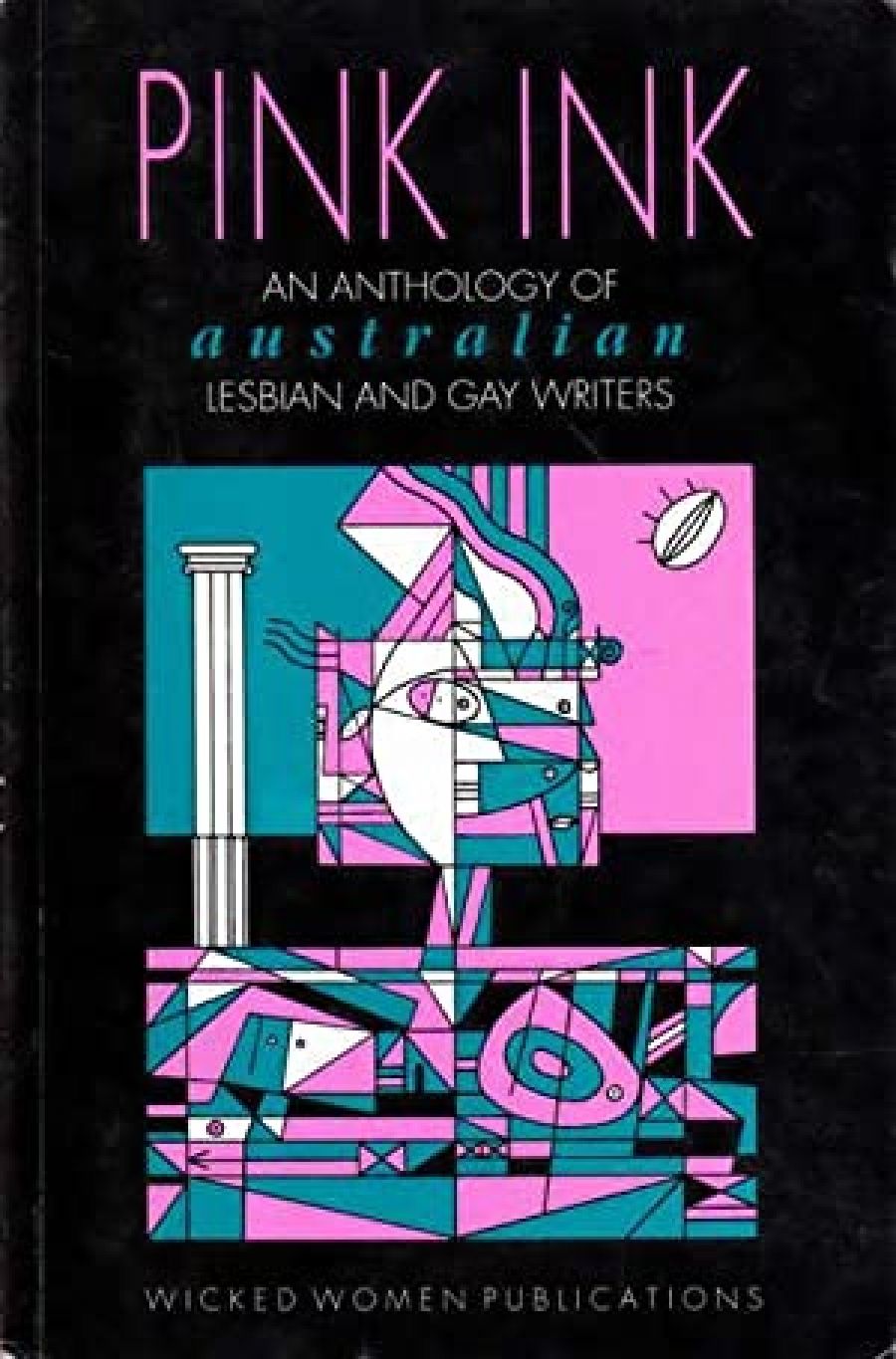
- Free Article: No
- Contents Category: Gender
- Review Article: Yes
- Article Title: Pokes, Prods and Challenges
- Article Subtitle: Two books from a gay perspectives
- Online Only: No
- Custom Highlight Text:
In Australia there is a paucity of serious lesbian critical comment regarding lesbian and gay writing. In Island last year, Dennis Altman suggested that there is little of interest being written while there is a ‘peculiar squeamishness amongst literary critics to critically comment about Patrick White or any other gay and lesbian writer’.
- Book 1 Title: Pink Ink
- Book 1 Biblio: Wicked Women Publications, $14.95pb
- Book 2 Title: Distractions
- Book 2 Biblio: Blackwattle, $13.95pb, 1875243070
With its distinctive pink and black cover, Pink Ink is very ‘aware’ of writing forms and writing practices, readership, and even the critical reception of books.
Michael Hurley’s Introduction dominates. Perhaps this is an unintended effect but by its very own will, the Introduction is a tour de force. It shimmers with narrative magic and delicately balances between postmodern egotism and postmodern self-reflexiveness. It pokes, prods, and challenges the orthodox writing conventions of an introduction. It provides an informative overview of gay and lesbian writings in Australia over the last century and proposes that there has been a proliferation by some mainstream and small, independent publishing houses.
‘Lou’s Cunt’ by Linda Dement is, literally, a knock-over. It bangs and bangs the reader over the head with an insistent and dissonant beat. It could be described as trite or boring or lacking the finesse of nice writing. But it is this that it positions itself against, and in this it represents the sexuality of women where desire constantly confronts the constraints of the patriarchal social formation.
Xalid Abd-Ul-Wahid uses the feet, usually the site of germs and dirt, to pay loving homage to his loved one. In ‘Domine Non Sun Dignus’, he writes:
I love your feet
for the countless streets
They have wandered and woken
Before the dawn put a match
to the curtained sky
Wendy Moulstone writes poems and short stories. In ‘White Roses’, a woman leads a bland institutional life except for the ‘fine, white roses’ that are her passion. In ‘A Rental Crisis’ by Gary Dunne, Simon sits at the front table sipping coffee and looking at the ‘street scenery’. He meets ‘Bankstown Blue – looks warm and practicable’. ‘Banks town Blue’ is Rick, who arrives in Sydney from Melbourne. Rick stays the night, and this extends to two, and more, and they seem to be forming a whimsical arrangement.
There are many other contributions in the anthology. A great number of them deal with that ill-defined state called love – its first great revelatory and celebratory moments. This causes many individuals to put pen to paper, with varying results. (But what is quality?)
Distractions by Benedict Ciantar is ‘a personal voyage of a young man coping with romance in the nineties’. The book is a slim volume informed by the Bildungsroman form of nineteenth-century romanticism where the protagonist follows a path to self-discovery and maturity.
Matt, the ‘I’ of the novel, meets a boy, HIM. A short time later, Matt, HIM, and a friend travel to Perth. The two-week holiday is not a success since fears and uncertainties abound. Wisely or unwisely, Matt and HIM then decide to travel the rest of Australia, via Darwin and Brisbane. On their bus trip, there are, again, fears and uncertainties. One or the other seems to want to articulate these, but they are unable. After the trip, they decide to remain friends (it is not explained why), even though HIM finds another boyfriend.
There are other ‘distractions’, such as the close supporting networks with flatmates. There are the usual inner-city distractions: dance parties with stream-of-consciousness descriptions; nights raging at clubs, and then on to work the following day.
In a curious gesture, the love-to-be is never named. The absence of the proper noun parallels the absence of a lover in the life of the storyteller. It is as if it would be all too real to name him. Matt experiences crises. He quits his job, and for a while moves back with his mother where he recuperates and is able to ‘cope’ with life.
At times the story loses direction. Perhaps the manuscript required more scrupulous editing. The threads are lost in the profusion of words. For example, it is not explained why Matt and HIM decide to travel around Australia, nor why they are unable to articulate their uncertainties.
For a first novel it is an admirable attempt. And yet, like similar gay and lesbian writing, it lacks complexity and its focus is extremely limited. The fiction revolves in a narrow tunnel: the ghetto. It does not move out into the wider social formation in the way that North American and British gay and lesbian writing does.


Comments powered by CComment